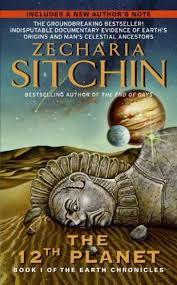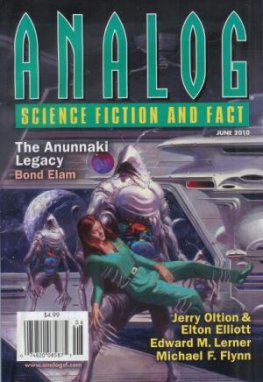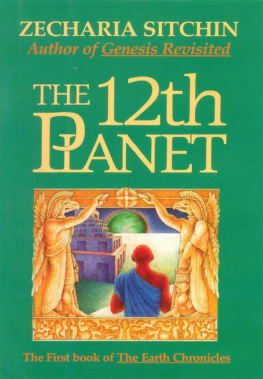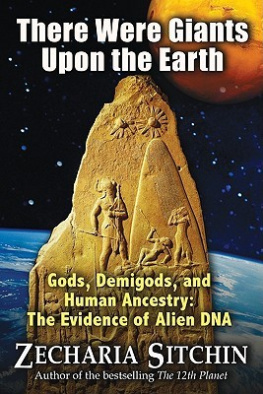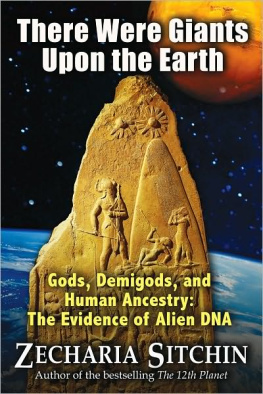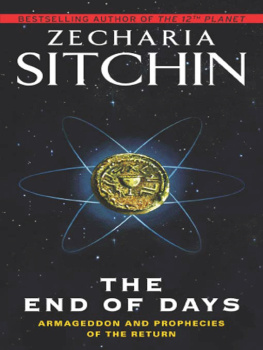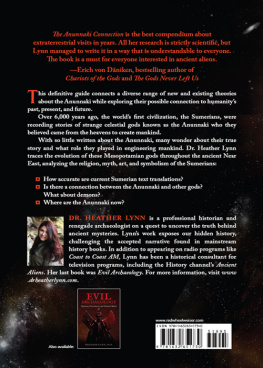Zecharia Sitchin - The Anunnaki Chronicles
Here you can read online Zecharia Sitchin - The Anunnaki Chronicles full text of the book (entire story) in english for free. Download pdf and epub, get meaning, cover and reviews about this ebook. year: 2015, publisher: Inner Traditions/Bear & Company, genre: Religion. Description of the work, (preface) as well as reviews are available. Best literature library LitArk.com created for fans of good reading and offers a wide selection of genres:
Romance novel
Science fiction
Adventure
Detective
Science
History
Home and family
Prose
Art
Politics
Computer
Non-fiction
Religion
Business
Children
Humor
Choose a favorite category and find really read worthwhile books. Enjoy immersion in the world of imagination, feel the emotions of the characters or learn something new for yourself, make an fascinating discovery.

- Book:The Anunnaki Chronicles
- Author:
- Publisher:Inner Traditions/Bear & Company
- Genre:
- Year:2015
- Rating:3 / 5
- Favourites:Add to favourites
- Your mark:
- 60
- 1
- 2
- 3
- 4
- 5
The Anunnaki Chronicles: summary, description and annotation
We offer to read an annotation, description, summary or preface (depends on what the author of the book "The Anunnaki Chronicles" wrote himself). If you haven't found the necessary information about the book — write in the comments, we will try to find it.
The Anunnaki Chronicles — read online for free the complete book (whole text) full work
Below is the text of the book, divided by pages. System saving the place of the last page read, allows you to conveniently read the book "The Anunnaki Chronicles" online for free, without having to search again every time where you left off. Put a bookmark, and you can go to the page where you finished reading at any time.
Font size:
Interval:
Bookmark:
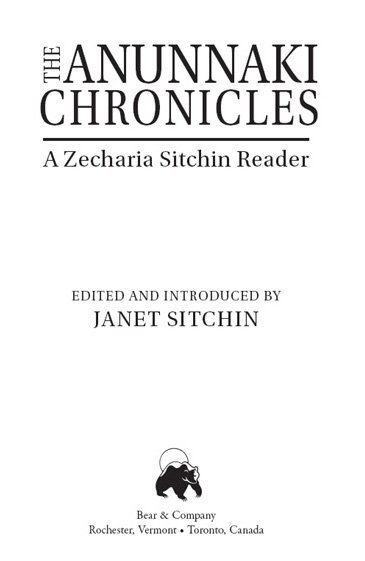

Dedicated in memory of my uncle Zecharia,
who started this journey for the Sitchin family,
and in honor of my father,
Amnon Sitchin,
who first brought my attention to my uncles work.
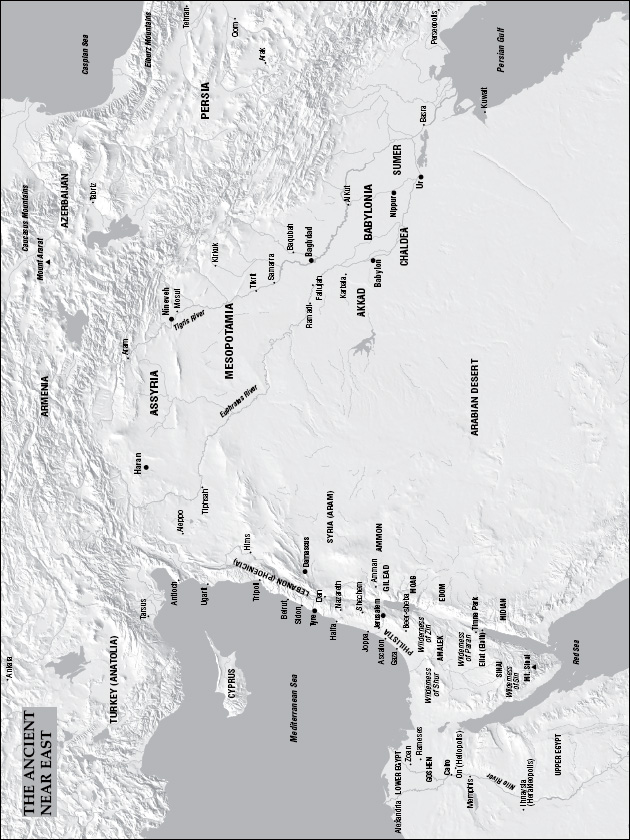
Introduction
Those who had a chance to meet Zecharia Sitchinat seminars, tours, book signings, or speaking engagementswere familiar with his modesty, warmth, understated intellect, dry humor, and his precisely chosen words, especially when he was speaking on a set of topics that he loved to discuss, on the subject of ancient civilizations, which included the ideas of ancient extraterrestrials coming to Earth. When he was engaged in a discussion of this nature, his demeanor was strong proof that the conversation was a serious one; his ideas were rooted in facts and not in wild speculation or fantasy.
My uncle Zecharias first book, The 12th Planet, was published when I was a teen, but I did not actually read all the way through it until many more years had passed. Its first one hundred pages or so are filled with facts and proofs, and more proofs and more physical evidence, all of which support his theories. Reading this all those years ago, I was daunted and put the book down. The inclusion of all these facts and proofs was done deliberately by him in order to establish that he was presenting scholarly material, not sensationalized ideas. Especially in that first literary outing, he wanted to show that evidence exists to support his theoriesand not just one piece of evidence, but many pieces of evidence. When I reread the book a few years ago, I was completely engrossed from page one.
My uncles interest in the topic of ancient civilizations and human origins derived from his reading the Hebrew Bible, or Old Testament, in its original Hebrew, and then comparing what he had read to common English translations that more times than not skewed the meaning. Most biblical scholars and archaeologists deem ancient writings to be allegory, myth, and/or legend, no matter whether the original source writings are from the Bible or are Sumerian, Akkadian, Assyrian, Egyptian, Greek, or Roman. Sitchins premise was this: What if these ancient tales are not legend or myth or allegory; what if they are history?
The incident that sparked his interest in this compelling question occurred when he was a schoolboy in Israel during the time of the British Mandate. His interest had been sparked in one pivotal moment (which we will discuss later in the book)and a life spent in research, the study of languages, travel, and museum visits would ensue. He accumulated so much fascinating evidence and developed so many fascinating theories and corollary ideas that his wife, Rina, encouraged him to stop talking and start writing. As a result, he went on to author fourteen nonfiction volumes on the subject of ancient civilizations; the first of which, The 12th Planet, was published in 1976.
Sitchin led tours to see the places and the ancient artifacts he mentioned in his books and began conducting what he called Sitchin Studies Seminars. I began attending the seminars to provide support to him, assisting with registration or doing whatever he needed me to do to ensure that things ran smoothly. At these seminars, I was fortunate to be able to hear him speak on the topics of his books and to hear the questions from his readers and the answers that he gave.
His words were always chosen carefully, given that he did not want to imply or put forward any idea for which he didnt have ample evidence and a firm conclusion in his mind about how the idea fit into the story of the Anunnaki (Those Who from Heaven to Earth Came). Well-meaning readers would frequently ask him to discuss various theories of other scholars, or to comment on aspects of ancient civilization that he hadnt researched or written about, or for which he did not yet have a solid conclusion or enough evidence. In these instances, he would invariably find a polite way to decline and say only what he knew to be true.
This integrity was a large part of his character and one of the reasons that he was well respected and believed. His goal in writing was to share the information he felt was vitally important for all of us, as a human family, to know about our origins. He said that he was a reporter, writing the story of the Anunnaki as recorded by ancient peoples.
There were always the detractors and those who ascribed to him ideas that he had never discussed, let alone written about. However, there also existed readers and associates from all walks of life who were forthcoming with material that might help him with his research. Some of these behind-the-scenes contributors were professionals who were worried that by publicly endorsing his ideas their scientific or academic careers would be jeopardized or destroyed. Professional condemnation for thinking outside the established paradigm is the reason why more college professors, archaeologists, astronomers, and other scientists dont speak out more frequently on the possibility of extraterrestrials visiting Earth, and other related topics. However, its interesting to note that many observatories are run by Jesuit priests; the Vatican has an interest in extraterrestrials; and NASA scientists have provided information to Sitchin.
In positing that the material from ancient writings and artifacts was, in fact, a recounting of historical events, and in seeing the same tales told in many different languages and yet involving the same personalities, Sitchin explored a new paradigm. This new paradigm also tacitly acknowledged that ancient accounts often described events and processes that were very technologically advanced. How would ancient people describe the launch of a NASA rocket? Perhaps in the same way that the tale of Gilgamesh discusses events that he, Gilgamesh, witnessed in ancient times. How would ancient people have explained a modern cell phone, especially a smart phone? They didnt have the technological language to explain exactly how a cell phone or a smart phone worked. Instead, to them, it operated as a provenance of the special magical powers of the gods. How would archaeologists of the nineteenth or early twentieth centuryin an era where there were no cars or airplanes or computersdescribe the things that the ancients had witnessed and that, indeed, were part and parcel of their everyday lives?
The stories of the ancients must be myth, because anything else would be beyond belief.
However, as our own society has advanced technologically, its easier to envisage earlier cultures enjoying the benefits of technology too. In a time when man has landed on the moon, a celestial craft could more aptly be imagined and described. Old translations that previously made no sense can now be interpreted in this more modern way. This is another part of Sitchins premise and also why he deviates in his interpretations of the facts that have been accepted by other scholars. He understood that when a particular set of events was interpreted had a direct bearing on its interpretation. Looking at the same events with a modern eye allows for a more expanded view of those events.
Translations are also subject to interpretation based on the experience, background, and worldview of the translator as well as being a product of the times in which the translator is operating. In Sitchins research, he only wanted to draw upon material in its original language, so he wouldnt have to rely on a translation whose meaning might be skewed. He felt that reading a document in its original language provided access to nuances of meaning that otherwise might be lost or modified in translation.
Font size:
Interval:
Bookmark:
Similar books «The Anunnaki Chronicles»
Look at similar books to The Anunnaki Chronicles. We have selected literature similar in name and meaning in the hope of providing readers with more options to find new, interesting, not yet read works.
Discussion, reviews of the book The Anunnaki Chronicles and just readers' own opinions. Leave your comments, write what you think about the work, its meaning or the main characters. Specify what exactly you liked and what you didn't like, and why you think so.

